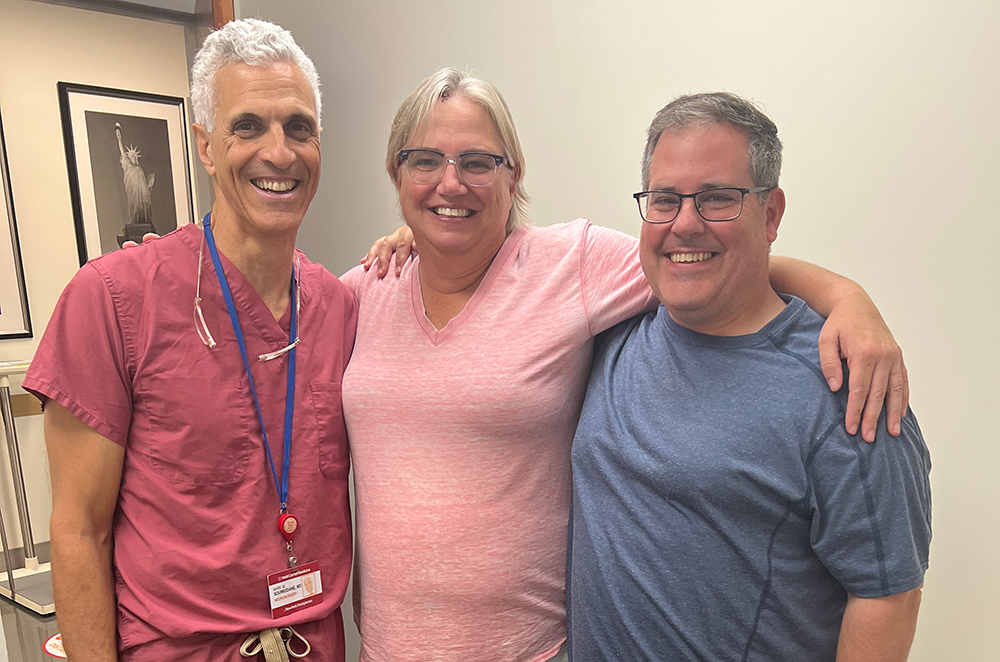
Three years ago, Beth Willey of Marlow, New Hampshire, traded her tech-industry job for a quieter life at home. “I wanted to do something fun,” she says, “and to be home to take care of my elderly parents and my young children. I started a business out of my home, grooming dogs and breeding Great Danes. It’s so much fun!” Beth’s idyllic new start, however, took an unexpected turn when a long-dormant colloid cyst suddenly demanded her attention. Thanks to Dr. Mark Souweidane and his team at NewYork-Presbyterian and Weill Cornell Medicine, Beth is back to the people (and pups) who depend on her.
“It started around eighteen years ago,” she recalls. “I was having headaches and feeling dizzy, so I had a CT scan, and that’s when they saw the colloid cyst. At first I was told I’d need surgery, but one MRI and an overnight stay later, the neurosurgeon changed course and decided to monitor it instead.”
That was reasonable advice, says Dr. Souweidane now. “A colloid cyst is a slow-growing tumor in the brain,” he says, “and in most cases, it stays small and benign. Rather than perform any kind of surgery, doctors often just monitor it yearly. As long as the cyst stays small and doesn’t move, surgery often isn’t called for.”
If the cyst grows, however, it can obstruct the flow of cerebrospinal fluid (CSF). A buildup of CSF in the brain results in increased pressure in the skull, which can in turn lead to headaches, vomiting, nausea, or balance issues. In the rare case of a total blockage, it can even mean sudden death.
Returning for scans year after year became what Beth calls the “arduous watch and wait.” Luckily, each visit showed little change, and in 2020 her doctor suggested that she could start having scans every two to three years instead of annually.
“At my first three-year scan, in 2023, they found the cyst had grown significantly,” Beth says. The larger size changed her risk, and her doctor recommended surgery.
“My local neurosurgeon was great but didn’t have a lot of experience with colloid cysts,” Beth says. After years of belonging to a Facebook group called Colloid Cyst Survivors, Beth knew exactly which neurosurgeon she wanted to see.
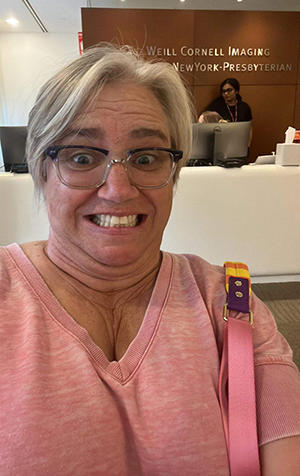
Even when you have full confidence that you're in the right place, the prospect of brain surgery can be daunting.
“So many members posted stories about their experiences with Dr. Souweidane,” recalls Beth. “They reported excellent outcomes, then they disappeared from the support group. This told me that they got on with their lives, that their story with their cyst was over.” That’s exactly what Beth wanted – to get on with her life.
“Most doctors don’t come across colloid cysts all that often,” says Dr. Souweidane. “They are rare — and as a result, doctors who are knowledgeable about them are just as rare. In addition, not many surgeons are experienced in the advanced endoscopic approach, which completely changes the risk equation and in the past two decades has revolutionized colloid cyst surgery.” Dr. Souweidane has been a pioneer and champion of endoscopic surgery for colloid cysts, with more than 200 such procedures performed over the past 20 years. (See more about endoscopic surgery for colloid cysts, including a video of the procedure.)
Beth was eager to get going, since her symptoms had become more intense around the time of that three-year scan. “In the mornings I experienced stabbing headaches, along with massive anxiety attacks that caused even more headaches,” she says. “I even saw fractals when I’d wake up from sleep. I didn’t know if it was caused by the cyst or something else, but I knew something needed to be done.” She knew she wanted to see Dr. Souweidane, even though he was a four-and-a-half-hour drive from New Hampshire.
“I wanted to talk to this famous man,” she exclaims. “If he couldn’t do my surgery, I’d at least get a second opinion. I gave his office a call, and within 24 hours I had an appointment. I was very excited, and very happy.”
Dr. Souweidane and his team did not disappoint. “When I walked into his office, it was like meeting a celebrity,” Beth laughs. “He has a charismatic confidence about him that really makes you feel at ease. His staff, especially his PA, Alexa, were really supportive. Everyone was quick to answer questions and talk through any of my concerns. Throughout the process, I felt like I mattered.”
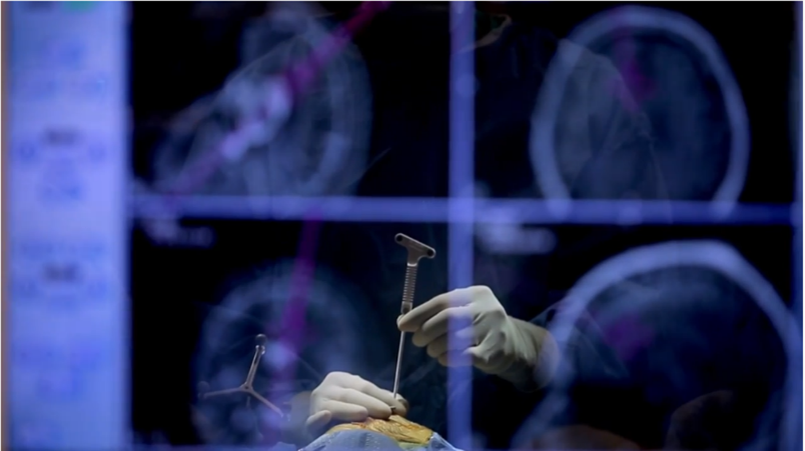
Endoscopic surgery for colloid cysts has completely changed the risk-benefit analysis. Here, Dr. Souweidane removes a cyst (not Beth's) using advanced intra-operative imaging and tiny endoscopic tools.
“Our patients put their lives in our hands, and we take that seriously,” Dr. Souweidane says. “Colloid cysts were once considered too dangerous to reach with open surgery, but the arrival of the endoscope completely changed the game. With the endoscopic approach, there’s no need to open up the skull and risk the complications that come with that. Removing the cyst endoscopically involves making one small entry hole, navigating directly to the cyst, and eliminating it with small surgical tools.”
"Trust in the surgeons, the staff, and whatever higher power you believe in. Life is so much better on the other side!”
“The day of the surgery, the anesthesiologist could see how nervous I was,” recalls Beth. “I told her I have two small kids and a lot of people who count on me. I was scared I wouldn’t wake up. She hugged me and promised me they would take excellent care of me. Her words held true. When I woke up, my husband told me Dr. Souweidane had removed all of the cyst. It was completely gone. A smile grew on my face — I survived brain surgery!”
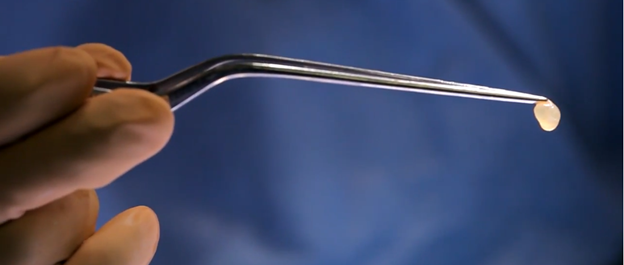
A small cyst like this one can create tremendous risk in the brain. Here, Dr. Souweidane removes a colloid cyst (not Beth’s) using tiny endoscopic tools.
Beth was discharged from the hospital the very next day. “I had surgery on September 8, I was at my hotel on September 9, and my husband and I were walking around New York City eating at a raman restaurant on September 10 — I couldn’t believe how quickly I recovered! I kept saying that if I had known it was this easy I’d have done it a long time ago. I had one final appointment on September 12, where they cleared me to go back home.”
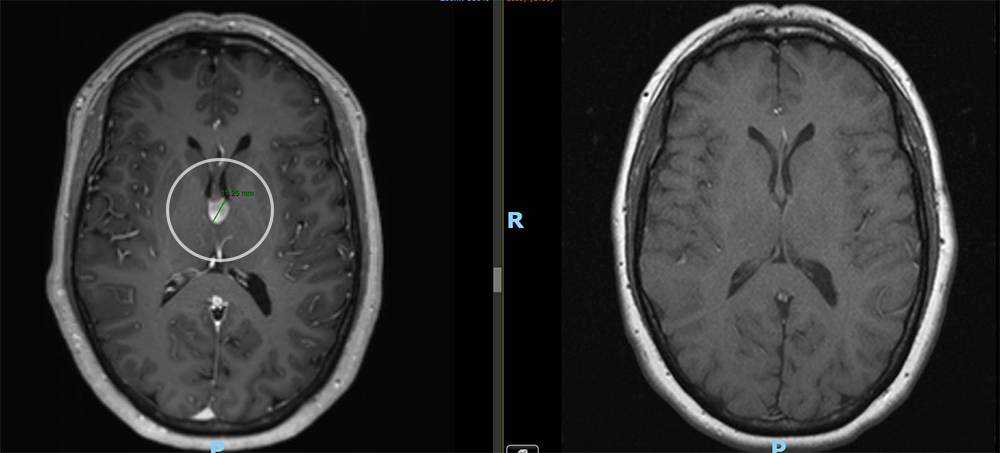
A pre-op scan shows Beth's dangerously large colloid cyst (left); at right is her cyst-free post-op scan
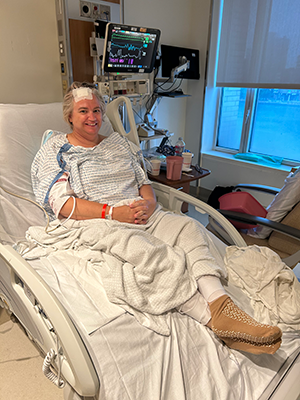
Beth's recovery was remarkably quick
Like the other members of that Facebook group, Beth’s story with her cyst was over. But she does have some advice: “When I learned that my cyst had grown, I started to have terrible anxiety about every ache and pain,” she says. “My doctor said that I’d had a one to ten percent chance of sudden death — that was too high for me to bear. It wasn’t until after surgery that I realized that this huge mental weight had been lifted. Trust in the surgeons, the staff, and whatever higher power you believe in. Life is so much better on the other side!”